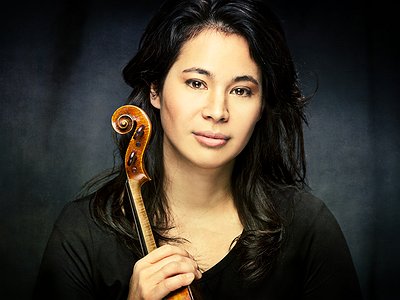Part 2
What constitutes a good live performance in your opinion? What’s your approach to performing on stage?
To be authentic and to enjoy.
The effect of a piece doesn't merely depend on the performance of the musicians, but also on the place it is performed at. How do you see the relationship between location and sound? In how far do you feel the current system of concert halls is still the right one for classical music in general?
I think that we have great concert halls nowadays for orchestral concerts and we can find so many wonderful halls for any kind of music. It's really important to programme concerts always considering the acoustics and the atmosphere of the place. I personally like also the idea of organizing concerts in places that were not intended to be concert venues because of the special atmosphere that this can create.
And sometimes you go to remote places, where the only hall has a bad acoustic, and still, it's possible to create an atmosphere, that both public and musicians enjoy a lot.
As Charles Rosen put, “the death of classical music is perhaps its oldest continuing tradition”. From your perspective, what are some of the root issues for what is generally referred to as the “crisis of classical music” and what, to you, are sensible ideas for improving it?
If you refer to the public, there is no crisis in classical music. There is and will be always a huge number of people that come to concerts.
The big crisis is here:
Governments try to save expenses on culture, but culture needs a huge investment. Investment into education. This is what builds the future of a healthy society. We should not get tired of showing the politicians how important this support is. And of course, one of the most important things is to open possibilities for children to get to know music. Through my chamber music festival, I try to reach out to children through special events. The festival is also a platform to reach politicians in order to expose them to the cultural programmes that need their support.
Music-sharing sites and -blogs as well as a flood of releases and concerts in general are presenting both listeners and artists with challenging questions. What's your view on the value of music today? In what way does the abundance of music change our perception of it?
I think that there is an abundance in almost every aspect of our social life. Or do I only feel like that because I experience the world this way now and not some years ago? It is more the variety and quantity of information about music and interpreters that is so challenging. How fast can we still get?
Many artists are finding it hard to secure a living with their music and in which way, do you feel, could that be improved ?
Many teachers in universities, that teach on the highest level are faced with this problem. Governments have to support because otherwise, education will suffer a lot.
Reaching audiences usually involves reaching out to the press and possibly working with a PR company. What's your perspective on the promo system? In which way do music journalism and PR companies change the way music is perceived by the public ?
I don’t think that music journalism or PR companies influence the relationship between public and music.
Concerts have to be promoted, young artists need a platform to start a career. But both sides stay independent in the essential: Music making and the perception of music.
Usually, it is considered that it is the job of the artist to win over an audience. But listening is also an active, rather than just a passive process. How do you see the role of the listener in the musical communication process?
Only through the reflection of the listener a musical artwork finally fulfils its meaning on stage. That is why a piece sounds different in front of different audiences.






